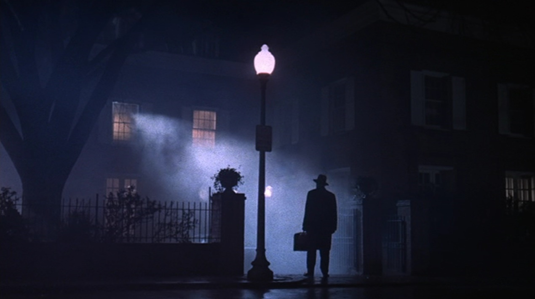Limits as Plot Devices
AJ Robinson

Did you know the devil had a tough time fighting a little girl? It’s true, fictionally anyway. In the book and film, The Exorcist, the devil tries to take over little Regan, a twelve year old girl, and it’s not an easy task.
The battle raged.
The devil versus Regan starts out small. Regan feels odd. She starts acting strange. Her language becomes quite salty. Gradually, she becomes violent; speaks in tongues and finally judged as possessed.
This is when the priests come in to perform the exorcism. They have a long hard battle. It makes for quite the powerful scene.
This is one of the aspects of great storytelling. It comes down to one simple rule. Put limits on the events and characters in your story.
Contrast this with the film Fallen. In this story, a demon, called Azazel, can instantly possess anyone and make him or her do anything he, Azazel, wants, even kill. The movie was not a hit; I didn’t bother seeing it.
My attitude was what’s the point? When the story involves one character, protagonist or antagonist, that is all-powerful, how can you fight them? You can’t, which makes the story boring.
Character vulnerability is an important part of in a story. If a character is predictable, say, all powerful, there’s no suspense. Readers, listeners and viewers expect the unexpected.
A story in the long-running television series, Doctor Who, the same plot device, as Fallen, but did it far better. A character, Meglos, needed a physical body to inhabit; his mind was in essentially a giant cactus! He makes a deal with space pirates to bring him an earthling, a bespectacled executive, with a briefcase.
Meglos and the executive go into a machine, where they merge, much as did the scientist and the fly, in the film, The Fly. Meglos then re-shapes their merged body to carry out his nefarious plan. Here’s the thing: occasionally the earthling tries to wrest control of their body away from Meglos and he must stop what he’s doing to remain dominant. These incidents cost him time and, ultimately, contribute to his defeat.
Time travel can also cause trouble in a story.
Doctor Who makes use of time travel on a regular basis, in almost every story, but the writers are smart enough to not have the characters go back to change something that’s already happened. In fact, they’ve had episodes where supporting characters have asked or suggested just such a thing, and the Doctor has told them it’s impossible.
Other television shows and films have not been so smart. The first Superman film had Superman save Lois Lane by turning back time, which was a weak plot device. It begs the question: is this what he’s going to do anytime things get tough in the future?
Similarly, the Harry Potter stories made use of time travel via a magical device called a Time Turner. Again, it begs the question: could it change events? Could Harry go back and save his parents? Could Snape go back and stop Voldemort from becoming a powerful wizard?
A fellow author and friend faced a similar dilemma while writing a story based on Irish folklore. She made use of a relic called, the Stone of Fal, which allowed the user to glimpse the future. She wondered: how can I have the main characters use this thing, but not over use it? I don’t want them knowing the future in detail.
My friend came up with an easy fix. The Stone drew its power from how far the user wanted to look into the future. The farther the user wanted to look into the future, the greater the price paid. For example, try to see an hour into the future and your legs go numb for a while. If you look forward half a day, you’ll pass out for an hour. Try to see a couple days and you’ll be in a coma for a week!
This is an effective limiting factor.
Keep this in mind when creating a story. Don’t make a person or thing that is all-powerful. It’s boring, whereas vulnerability is suspense and entertaining.
Combining the gimlet-eye of Philip Roth with the precisive mind of Lionel Trilling, AJ Robinson writes about what goes bump in the mind, of 21st century adults. Raised in Boston, with summers on Martha's Vineyard, AJ now lives in Florida. Working, again, as an engineeer, after years out of the field due to 2009 recession and slow recovery, Robinson finds time to write. His liberal, note the small "l," sensibilities often lead to bouts of righteous indignation, well focused and true. His teen vampire adventure novel, "Vampire Vendetta," will publish in 2020. Robinson continues to write books, screenplays and teleplays and keeps hoping for that big break.
- Love Among the Ruins
- Look Back + Forward
- Little Memoires
- Strange Weather Indeed
- On Being Last
- Magic Rocks
- Chistian Oxymorons
Click above to tell a friend about this article.
Recommended
- David Simmonds
- County Vitals
- Lament of a Soccer Nut
- DNA Dark and Light

- Sjef Frenken
- Relativity in Action
- Modes of Transportation
- Launching Dreams

- Jennifer Flaten
- Zombies and Snoopy
- All You Can Eat
- Computer Security

- M Alan Roberts
- Big Fat Deal
- Economics, War and Politics
- Doing Time, Why

Recommended
- Matt Seinberg
- Forgetfulness
- The COVID-19 Conspiracy
- Car Accident Part 2

- Streeter Click
- Remembering the Pioneers
- Ode to Groucho
- Hollywood Dreams

Recommended
- AJ Robinson
- Agent for Orange
- Nuts
- Watch Our Six

- Jane Doe
- The USA in 2017
- Argo
- Buying an Amp

- M Adam Roberts
- My Eraser
- Son of a Gun
- Dream On

- Ricardo Teixeira
- The Unicorn
- Harmony
- Monkey Business




